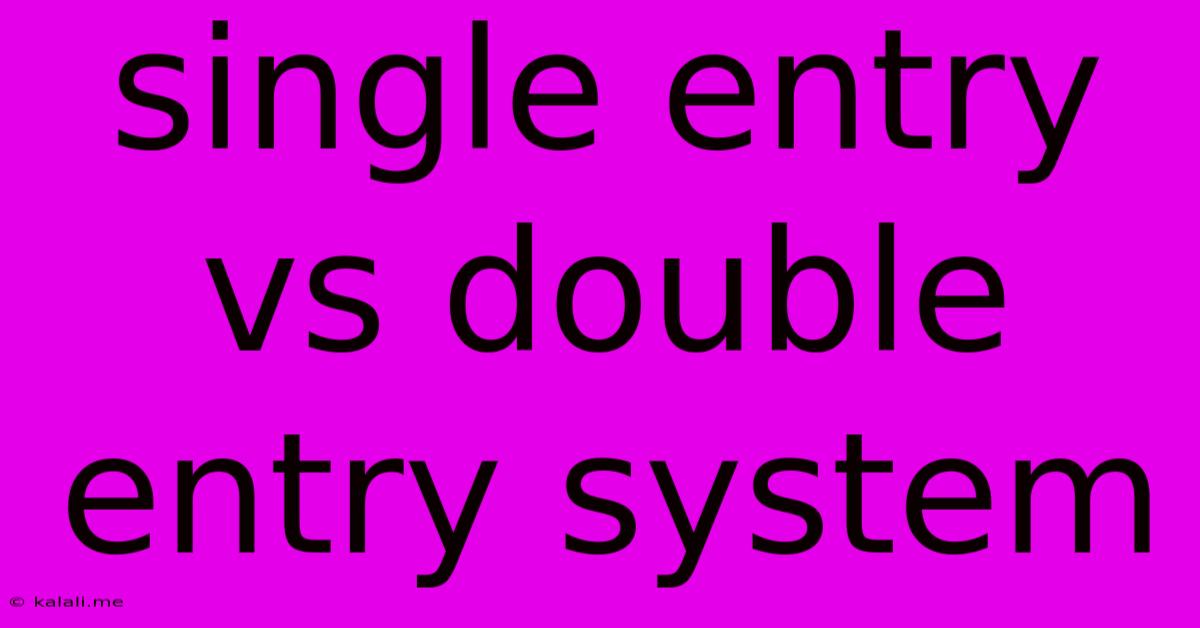Single Entry Vs Double Entry System
Kalali
Jun 13, 2025 · 3 min read

Table of Contents
Single Entry vs. Double Entry Bookkeeping: Which System is Right for You?
Choosing the right bookkeeping system is crucial for the financial health of any business, regardless of size. This article compares single-entry and double-entry bookkeeping systems, highlighting their key differences, advantages, and disadvantages to help you decide which best suits your needs. Understanding these differences will ensure you choose a system that provides accurate, reliable financial information for informed decision-making.
What is Single-Entry Bookkeeping?
Single-entry bookkeeping is a simplified accounting method that records only one side of a transaction. It focuses primarily on cash inflows and outflows, tracking revenue and expenses in separate accounts. This system is usually less complex and requires minimal training, making it suitable for smaller businesses or individuals with simpler financial needs. However, its simplicity comes at a cost, offering limited insight into the overall financial picture.
Advantages of Single-Entry Bookkeeping:
- Simplicity: Easy to learn and implement, requiring minimal accounting knowledge.
- Cost-Effective: Lower initial investment in software or professional accounting services.
- Quick Record Keeping: Faster transaction recording compared to double-entry.
Disadvantages of Single-Entry Bookkeeping:
- Limited Financial Information: Doesn't provide a complete picture of a business's financial health. It lacks the crucial balance sheet, hindering the ability to analyze assets, liabilities, and equity.
- Higher Error Rate: Prone to errors due to its lack of checks and balances. Reconciliation is more challenging.
- Difficult for Growth: Scaling a business becomes difficult as the system lacks the depth to manage increasingly complex financial transactions. It isn't suitable for tax purposes or securing loans.
What is Double-Entry Bookkeeping?
Double-entry bookkeeping is a more comprehensive accounting method that records every transaction twice – once as a debit and once as a credit. This adheres to the fundamental accounting equation: Assets = Liabilities + Equity. Every transaction affects at least two accounts, ensuring that the accounting equation remains balanced. This method provides a more thorough and accurate picture of a company's financial position.
Advantages of Double-Entry Bookkeeping:
- Comprehensive Financial Picture: Offers a detailed view of a business's financial health, including assets, liabilities, and equity.
- Improved Accuracy: The dual-entry system provides built-in checks and balances, minimizing errors. Reconciliation is more straightforward.
- Suitable for Growth: Handles complex financial transactions efficiently, allowing for easier scaling and expansion. Essential for tax compliance and securing loans.
- Enhanced Audit Trail: Provides a clear audit trail, useful for internal and external audits.
Disadvantages of Double-Entry Bookkeeping:
- Complexity: Requires more accounting knowledge and training.
- Higher Costs: Potentially higher initial investment in software or professional accounting services.
- Time-Consuming: Transaction recording can be more time-consuming compared to single-entry.
Single-Entry vs. Double-Entry: A Summary Table
| Feature | Single-Entry | Double-Entry |
|---|---|---|
| Complexity | Simple | Complex |
| Accuracy | Lower | Higher |
| Cost | Lower | Higher |
| Financial Data | Limited; focuses on cash transactions | Comprehensive; includes assets, liabilities, equity |
| Scalability | Poor; unsuitable for growing businesses | Excellent; ideal for growing businesses |
| Suitable For | Small businesses with simple transactions | Businesses of all sizes, seeking detailed financial information |
Choosing the Right System
The best bookkeeping system depends on your specific needs and circumstances. Small businesses with simple financial transactions might find single-entry sufficient for basic record-keeping. However, as businesses grow and their financial activities become more complex, double-entry bookkeeping becomes essential for accurate financial reporting, efficient management, and securing funding. Consider consulting with an accountant to determine the most appropriate system for your business. They can help you navigate the complexities and ensure you are using the most effective method for managing your finances.
Latest Posts
Latest Posts
-
Which Of The Following Is A Nonrenewable Energy Source
Jun 14, 2025
-
What Planet Is Known As The Morning Star
Jun 14, 2025
-
Gpa Requirements For Utah State University
Jun 14, 2025
-
Given Wxyz What Is The Measure Of Z
Jun 14, 2025
-
Which Of The Following Statements Is True Of A Group
Jun 14, 2025
Related Post
Thank you for visiting our website which covers about Single Entry Vs Double Entry System . We hope the information provided has been useful to you. Feel free to contact us if you have any questions or need further assistance. See you next time and don't miss to bookmark.